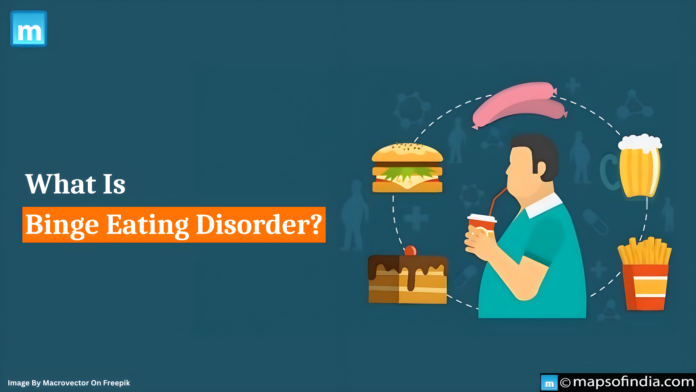It’s important to understand that for some people, their relationship with food can become problematic and even destructive in a world where food is widely accessible and frequently utilised as a source of comfort, enjoyment, and socialising. The most prevalent eating problem in the country, binge eating disorder, affects people of all sexes, ages, and socioeconomic backgrounds. People who have BED frequently have uncontrollable episodes of binge eating, where they eat a lot of food in a short amount of time (usually two hours). People often feel guilty, ashamed, and distressed during these episodes, which might help to keep the binge eating cycle going.
Binge Eating Disorder Symptoms
The following are some of the main signs of binge eating disorder:
- Recurrent episodes of binge eating: This entails eating an excessive amount of food in a short period, frequently accompanied by a sense of helplessness.
- Emotional distress: BED sufferers frequently feel overwhelming guilt, shame, embarrassment, and contempt after bingeing.
- Lack of compensatory behaviours: People with BED often do not engage in compensatory behaviours such as purging or excessive exercise, in contrast to people with bulimia nervosa.
- Preoccupation with food and body image: A person’s thoughts may be dominated by thoughts about their diet, weight, or body type, which can cause anxiety and lower self-esteem.
Risk factors and the causes
The reasons for binge eating disorder are complicated and multifaceted, combining elements from the environment, psychology, and genetics. The following are some typical BED risk factors:
- Biology and genetics: Given that binge eating disorder frequently runs in families, there is evidence to suggest that some genetic factors may contribute to the development of the disorder.
- Psychological factors: BED risk can be raised by psychological conditions such depression, anxiety, low self-esteem, and body dissatisfaction.
- Dieting and restrictive eating: Because the body has been starved of nutrients, frequent dieting and a history of restrictive eating behaviours can lead to periods of binge eating.
- Experiences with trauma: People who have gone through trauma, such as being physically or sexually abused, may be more likely to develop BED as a coping technique.
- Sociocultural influences: The development of binge eating disorder may be influenced by cultural pressures that emphasise thinness, appearance ideals, and media portrayals of unrealistic body standards.
Treatment
For those who suffer from binge eating disorder, getting expert assistance is essential. Various forms of treatment are possible, including the following:
- Psychotherapy: By addressing the underlying psychological issues, enhancing self-esteem, and creating healthy coping mechanisms, cognitive-behavioral therapy (CBT) has shown promising effects in treating BED.
- Medication: Some drugs, notably selective serotonin reuptake inhibitors (SSRIs), have been used to treat BED’s co-occurring illnesses, such as depression and anxiety.
- Nutritional guidance: Consulting a qualified dietitian can help you develop a balanced and healthy relationship with food, encourage mindful eating, and lessen the temptation to binge.
- Support groups: Taking part in group therapy or joining a support group can give people with BED a safe place to talk about their experiences, develop new perspectives, and get support from others going through comparable difficulties.





